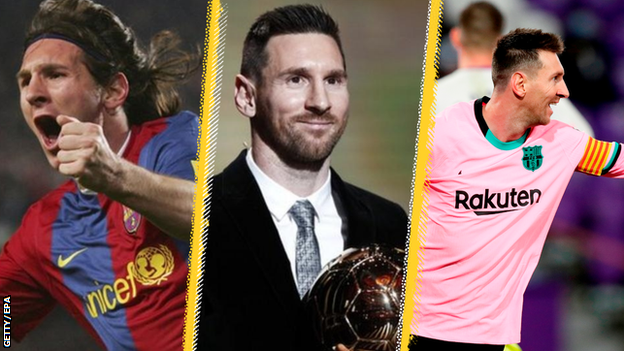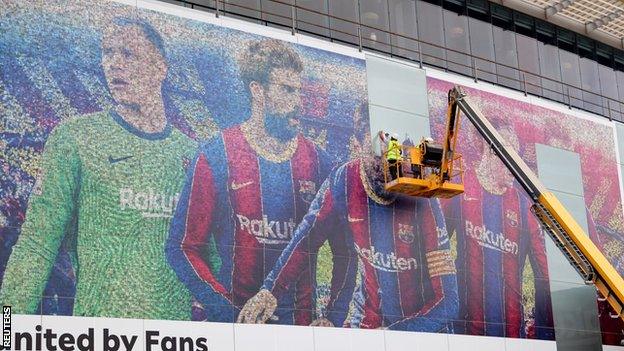'Lionel Messi feels betrayed by Barcelona' - the inside track on new PSG star's Nou Camp exit
- Published

So now we know for sure that the day Barcelona never thought they would see is upon them.
After more than 20 years, 778 games, 672 goals, 35 trophies including 10 La Liga titles, four Champions Leagues and numerous personal records and honours, Lionel Messi has left Barcelona.
Even as he packed his bags in readiness for a new life at Paris St-Germain, rumours were swirling around the Catalan capital that Barcelona were on the verge of making a last-ditch offer that would keep him at the club, rumours that sources close to both sides were quick to deny. It was not going to happen.
Rumours were started more in hope than expectation by a Catalan media outlet, perhaps unable to grasp the unimaginable reality that from now on this will be a Barcelona without Messi. If they are unable to accept it, imagine how Messi must be feeling.
To begin to try to understand where Messi finds himself as the six-time Ballon d'Or winner prepares for a new life in Paris, we should start with the end of the highly-emotional media conference at which he announced he would be leaving Barcelona.
At the end of it, the cold greeting Messi extended to the recently installed Barcelona president Joan Laporta was in sharp contrast to the effusive display of affection shown by the player when they met at the Nou Camp shortly after Laporta won election.
Lionel Messi: Ten great goals for Barcelona
Disguising his body language either on or off the pitch has never been the Argentine superstar's strong point.
Throughout the long and drawn out 'will he stay or will he go?' saga that has been playing out in Barcelona, Laporta has been unfailingly optimistic, always insisting he and Messi were very close, had an excellent relationship and that things were going very well.
Meanwhile, all the messages I was receiving from the Messi side were similarly upbeat, hopeful that a deal could be done. But - they insisted - they were much more cautious than the president.
Right from the start of his election campaign, Laporta insisted that not only would he be able to persuade Messi to stay (he just needed a "barbecue with him") but also that he was the only candidate who could do so.
So what did he know that the other candidates didn't? Because what he knows now about the Financial Fair Play regulations that have to be adhered to, the limitations the club are forced to operate under, are no different to what he knew then. Nothing has changed.
What he didn't know perhaps was the extent of the problem he and the club are facing.

Lionel Messi has spent his whole career at Barcelona... until now
Once in power he was obviously shocked to discover the level of debt. He expected to find a total debt from last season of about 200m euros and instead he has found it nudging 500m.
But also he owes his presidency to those who put down their money as guarantee of 15% of the budget, an obligation from the new directors to confirm the new regime. Those forces are now in charge of a club supposedly owned by season-ticket holders. And they do not want to keep Messi and continue with the huge debt.
A month and a half ago the two men went for dinner, after which Messi felt reassured that Laporta knew a way to guarantee he could stay at the club.
Barcelona eventually produced two different contracts, one for two years, the other for five. The five-year arrangement, which both parties shook hands on, was one the club felt sure would be approved by La Liga.
And at this point, things really start to get - if you pardon the pun - a bit, well, 'messy'.
La Liga boss Javier Tebas and Laporta met two or three days later, with Tebas telling him they could approve the Messi deal but that it might need the help of private equity group CVC, who have recently agreed a deal, pending club approval, that would inject 2.7bn euros (£2.3bn) into La Liga in exchange for just over a 10% stake in most of its business, with 90% of the injection going to clubs.
The problem with that idea was that Real Madrid and Barcelona decided to go against the deal; a deal would have brought money into the club and 15% of it - around 40m euros - could have been put towards the wage bill.
Although Laporta knew perfectly well that the only way Barcelona could keep Messi would be by accepting the deal (and expressed his enthusiasm for it when he met Tebas), he was convinced by Barcelona's new chief executive, Ferran Reverter, that doing so would not be in the best interests of the club.
Then things went from bad to worse when Reverter (who has not forgotten the club is now in the hands of those financial forces mentioned earlier) hit Laporta with some numbers that probably made the new president's blood run cold. With Messi's wages last season, the wage bill was 110% of income, without them 95%.
Put simply, things became impossible.

Pictures of Lionel Messi are being taken down at the Nou Camp
But the most worrying aspect, in the opinion of many, is not so much the fact that Laporta decided he was not going to give Messi a contract but rather the way the situation was explained to Messi and his father.
Laporta admitted he decided on the Tuesday not to give a new contract to Messi, two days before he told Jorge Messi that their Barcelona story was over. And now there are more and more clues emerging that the decision had in fact been taken even earlier.
Laporta, unsurprisingly, blamed La Liga and its lack of flexibility, while also maintaining that the proposed CVC investment plan was not in Barcelona's best interests.
But what has really irritated people and has already precipitated the resignation of director Jaume Llopis is the feeling that Barcelona have not done enough to keep him - and it's safe to say that Messi and his camp wholeheartedly agree.
In an interview with radio station Cadena Ser on Monday, Llopis said: "I didn't want to cause such a commotion. I resigned to have the freedom to be able to say what many Barcelona fans think and demand - transparency - which is something that has been lacking. Leo even said so himself: 'They didn't do everything that could have been done.'"
But perhaps the most damning revelation of all is the news that on the day of the Messi announcement Laporta was spotted in a top Barcelona restaurant along with Real Madrid president Florentino Perez and Juventus's Andrea Agnelli, the two most eloquent proponents of the controversial European Super League.
A scathing Llopis said: "Nobody can understand that while barcelonistas are crying about Leo leaving, Laporta is enjoying a fish supper with Real Madrid's president. That doesn't paint a very good image."
In their situation, Barcelona's financial common sense is understandable - but from Messi's point of view, he went on holiday confident everything would be resolved and came back convinced that all that was missing was his signature.
It broke Messi's heart and once again he feels betrayed by the club he has given so much to. Barcelona had asked him to accept a 50% reduction in wages and he accepted without even trying to negotiate it.
In fact a 50% reduction is the legal maximum anyone can be compelled to take, so even if Messi had been prepared to accept a bigger reduction, the club would have been breaking the law had they agreed to it.
After a successful Copa America with Argentina he felt good and his plan was to continue his top-level career for two more years, at which point he would be 36. After that, he intended to finish his playing days in Major League Soccer in the United States, possibly with Cesc Fabregas and possibly at David Beckham's Inter Miami.
While it is true that during his holiday in Ibiza he met with ex-Barca team-mate Neymar, Argentina team-mates Angel di Maria and Leandro Paredes, and Italian star Marco Verratti (all of whom play for PSG), nothing at that point had been decided and he still fully believed he would sign for Barcelona when he returned.
Messi had come close to leaving the club before. Back in 2014, just days before Tito Vilanova's death from cancer, the former coach had persuaded him to resist the advances of PSG. "You won't be as happy anywhere as you are here," Vilanova told him. Messi listened.
Then two years later, when he felt that he was being unfairly harassed by the Inland Revenue, he announced that he wanted to leave, not Barcelona, per se, but rather Spain itself. Once again he was talked around.
And then in 2020, after the 8-2 humiliation against Bayern Munich, he tried to put into effect a promise made to him by Bartomeu that he could leave at the end of the season, only for the board to renege on the pledge by claiming that Messi had not made his request in time. Messi's explanation of the situation was disarmingly simple. "I was lied to," he said.
Messi has been here before. Back in 2000, just six months after he arrived in Barcelona, during which time injury and bureaucracy had prevented him from playing, the 13-year-old sat down with his parents, two brothers and one sister to make the most important decision of his young life.
Messi told them he was going to stay - and the repercussions would go on to tear the family apart, with his brothers and sister eventually returning to Rosario with their mother while his father, Jorge, stayed with his son in Barcelona.
Now an immensely proud husband and father to three sons, he is desperate to ensure that history does not repeat itself. That is why last year he spoke at length, not just with his wife and soul mate Antonella, but also his children, about whether or not he should move.
Messi was brought up surrounded by the dust-blown, glass-strewn 'canchos' prevalent in the working-class district of Rosario but it is Barcelona that his sons Thiago (born 2012), Mateo (born 2015) and Ciro (born 2018) now call home.
There were tears then and there are tears now, and Messi has promised his family the move will only be temporary and they will all eventually return to Barcelona.
For now though, their future lies in Paris.

Instatraders: Is foreign exchange trading as easy as social media claims it to be?
Up Close with Billie Eilish: In an exclusive interview the music sensation opens up about the pressure of superfame
